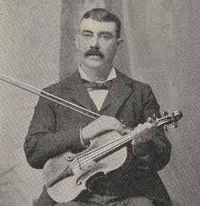Biography:John McFadden
John McFadden
| |
|---|---|
| Given name: | John |
| Middle name: | |
| Family name: | McFadden |
| Place of birth: | Carrowmore, near Newport, County Mayo |
| Place of death: | Chicago, Illinois |
| Year of birth: | c. 1847 |
| Year of death: | c. 1913 |
| Profile: | Musician |
| Source of information: | O'Neill - Irish Minstrels and Musicians |
Biographical notes
Francis O'Neill records in Irish Minstrels and Musicians (1913, p. 395-396):
Long before meeting this phenomenal fiddler the echol of his praises had reached our ears, and if we chanced to express our appreciation of the playing of others in his class, some one would ask, "Did you ever hear McFadden?" This of course implied that we might save our applause until we heard this traditional star. When the opportunity was presented at the wedding of a friend in 1897, all our expectations were realized but one.
The airy style of his playing, the clear crispness of his tones, and the rhythmic swing of his tunes, left nothing to be desired, yet in the manipulation of his instrument he violated all the laws of professional ethics. His bow hand seemed almost wooden in its stiffness, and the bow itself appeared to be superfluously long, for he seldom used more than half of it.
How he came to acquire such proficiency in execution is to many a matter of surprise, still when we consider the beauty of Chinese and Japanese workmanship, accomplished with the aid of tools crude in comparison with ours, the wonder disappears.
John McFadden, now in the sixties, was born in the townland of Carrowmore, a few miles north of Westport, County Mayo. His father and brother were also fiddlers, and whatever little rudimentary instruction he got was picked up in the family. Written music was a stranger to them, consequently all their tunes were memorized from the whistling and playing of others. It is a notable fact that musicians who learn by ear and play from memory have copious repertories, while those who learn from written or printed music are usually deficient in the memorizing faculty.
The facility with which McFadden learns new tunes is only equaled by his versatility in improvising variations as he plays them. So chronic has the latter practice grown that it is a matter of no little difficulty to reduce his playing to musical notation. The following instance may serve to illustrate this peculiarity:
While visiting Sergt. Early during a theatrical engagement in Chicago in 1911, "Patsy" Touhey, on the writer's suggestion, tried to learn "Hawk's Hornpipe" from McFadden. Phrase by phrase they progressed, Touhey submitting patiently to many minor changes according to "Mac's" fancy, until he thought he had the tune noted correctly. Then he played it, apparently in good style, but not to his preceptor's satisfaction evidently. "Let me show you, Patsy," says "Mac", in a kindly tone, and swinging his bow again ran the tune over once or twice. "Why, man alive, that's not how you gave it to me at all! You've changed the tune again: I guess we'll let it go this time," exclaimed Touhey, as he started to play something else on his pipes.
Possessing the gift of composition as well as execution, McFadden is the author of many fine dance tunes, composed without the aid of notes of memoranda, depending altogether on his memory for their retention. Like the offsprings of O'Carolan's brain, quite a few of McFadden's jigs and reels were preserved by others who taught them to him over again.
An incorrigible practical joker, many who admired his music feared his eccentricities in this respect, and, though sacrificing friendship to his whims occasionally, come what may, Democratic or Republican administration of municipal government, John McFadden always had friends numerous and influential enough to keep his name on the payroll of the city of Chicago.
Many of the 'big tunes' in the O'Neill collections come from the playing of John McFadden and his playing partner, Sergeant James Early, who hailed from South Leitrim, including "Broken Pledge (The)," a setting of "Paddy Ryan's Dream (2)" and "Bucks of Oranmore (The)." His own compositions (or likely his own work) include "Queen of the Fair", "McFadden's Own Reel" and "McFadden's Handsome Daughter."
